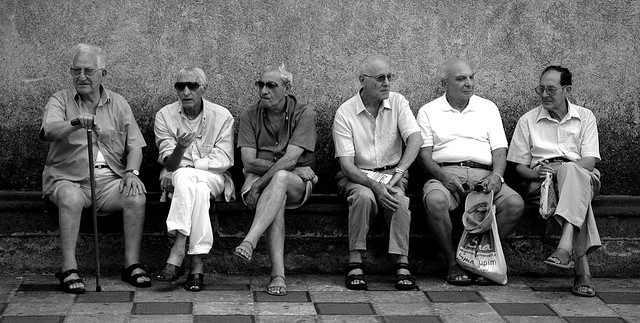 Photo credit: Mr Jive
Photo credit: Mr Jive
“Via Etnea! Etnea!” The young girl beside me on the bus is dredging up every last scrap of her English to tell the four tourists across the aisle from her where they are. “Here you work!” She mimes a walking action with her fingers and nods at the bemused-looking family. “Shop!” I’m pretty sure they don’t speak English.
The smiling man standing in the aisle next to the tourists, with the grey t-shirt stretched tight as a drum over his rotund belly, joins in. He sounds like he thinks he might be talking in English – but he’s not: it’s 100% Italian – as he tells them with pride that he lived in London for three years. The tourists smile and nod with polite incomprehension. I leap in, seeing the chance for a chat. “Seriously?” He gives me an incredulous grin. “You are English? Yes! In Stoke Newington! I made pizzas!” I beam back at him. Of course he did. He couldn’t look more like a pizzaiolo if he tried.
We start to talk about the areas in London where he lived – ‘Ack-nee, Ken-seeng-tonn, Say-fen See-stairs …’ – and his job. He went there knowing no English and doing what he could, but then one day the guy that made the baguettes in the local bakery got sick, so he took that over – and there he was, a baker and pizzaiolo. For three years in north London back in the early 90s.
The girl next to me joins in the conversation. “So how long have you been here?” I tell her my condensed story, well-practised after so long. “Two years in Catania, but four in Italy – I was in Calabria and Puglia before.” Her jaw drops. I assume she’s going to start talking about how hard Calabria is, but I’m wrong. “Two years? And you speak Italian this well?” I laugh inside: from my point of view, my Italian is dreadful. The girl continues. “I’ve been learning English for years, and I can’t say hardly anything. The grammar’s so hard!” She starts dissecting the present continuous tense, but the pizzaiolo soon gets bored, and starts talking about bread and about London again. The tourists get off the bus and the three of us wave them goodbye; I scoot into one of their vacated seats as the pizzaiolo, the girl and I continue to chat.
It turns out that the girl spent her summer in Calabria a couple of years ago, working in a camping village, and loved it. A spider web of links spreads out and we find all the things that we have in common. At any one time at least two of the three of us have something that we can both rabbit on about. We’re so engrossed in conversation that we’re almost at Acicastello, my destination half an hour outside Catania, before I realise where we are. Vic was supposed to be getting on the bus at Corso Italia in the centre of town. I glance over my shoulder, still listening and chatting to my new acquaintances about English characteristics versus Italian ones, but can’t see her. Dammit. If she’s missed this bus then there isn’t another one for two hours.
“This is my stop.” I shake hands with the pizzaiolo and wave to the girl, who’s taking a call from her mum on her mobile, and jump off, scrabbling in my bag to find my phone and send Vic a message to find out where she is. I don’t even look at the dark-haired girl in the green top who’s standing next to me until I hear a cheery, “Hello!” I look up: it’s Vic. “Oh my god! You *were* on it!” She laughs. “Yep. But I got stuck behind a load of people at the front, and then you were talking in Italian at the back and I knew I wouldn’t be able to keep up, so I just stayed where I was. Hi! Now – where’s this sagra happening …?”
A couple of hours later we’re standing in a queue of people, watching raw mussels being poured, kilos at a time, into steel pans sitting over roaring gas flames. The clatter of shells and hum of conversation are underpinned with a smell of hot sand and garlic, and my mouth waters as I watch cooks grabbing handfuls of chopped parsley and black pepper from giant bowls. They fling them into the pots with the mussels, then slosh white wine – maybe vinegar? – in on top. A quick stir with a three-foot-long wooden paddle and then the lid is wedged on to the pot for the bivalves to steam themselves open. It’s so simple. Fresh ingredients, cooked quickly without fuss. I love it.
A small girl walks past with a six-inch round tinfoil tray piled high with mussels and bread. Vic and I look at each other. “That’s the ‘super-pepata’, right?” says Vic, a little nervously. “Because seriously – that’s huge!”
When we reach the front of the queue we discover that the dish that the girl was carrying is the basic size. This may be the the most bargainous – and also the most filling – five euros that I’ve ever spent. I hand over my food ticket to the man in the orange t-shirt and bandanna and he looks up at me, assessing my non-Italian features. “This is the first time in your life you’ve had pepata di cozze?” he asks with a friendly smile. I nod, then correct myself, as my brain filters what he’s said, rather than what I was expecting to hear – “oh, no! Not in my life. Just the first time here.” Beside me, Vic interrupts – “first time in MY life!” I grin at the orange t-shirted man. “OK, it’s the first time SHE’s had it.” He laughs and passes the round tinfoil tray along the bench. “First time in her life! Make it good!”
I watch the server as he balances precarious slices of oval, yellow-edged bread on top of the mound of black-shelled mussels. His hands hover for a moment, making sure that nothing falls, then he moves them away. Vic goes to pick up the dish but he holds out a hand to stop her. “Wait a moment …” He tucks two bright yellow wedges of lemon into a space that he’s magicked out of nowhere – I swear it wasn’t there before – then stands back with a satisfied smirk and waves her on. “OK, you can take it now.” We slide the tinfoil trays carefully towards us onto napkin-covered hands, balancing them like waiters as we weave our way through the crowd and find a place to sit, exchanging our drink tickets for plastic beakers of local white wine as we go.
“So you’re speaking English, aren’t you?” says the boy sitting at the long trestle table in the seat next to Vic. She glances up from her food without a flicker. “No, it’s French.” His face falls and there’s a disappointed silence. She looks across at him. “OK. I’m joking. Yes, we’re speaking English.” He looks confused. “So why did you …” Vic relents. He doesn’t seem like a pick-up artist. He’s far too young for a start, and too easily rebuffed. He confesses later that he’s usually very shy, but the chance to speak English spurred him on. “I’m Antonio, by the way. Hello.” We start to chat, the three of us. His parents and little sister drift away, leaving him to it. Small-town living is grand.
“So did you hear what happened in Acitrezza the day before yesterday?” asks Antonio. Stuffing peppery mussels into my mouth, I shake my head and raise an inquisitive eyebrow at him. He takes a deep breath. “There is no music – did you notice?” This is the first time I’ve been to this sagra, so didn’t know that usually there would be karaoke as well as enormous dishes of food. The day before yesterday, however, high winds uprooted a palm tree in Acitrezza and someone was killed: the karaoke has been cancelled as a mark of respect. I gape in horror. I had no idea that it had been so windy – in Catania it hadn’t seemed like anything out of the ordinary. Antonio shrugs, embarrassed at being the centre of attention. Vic and I have, by now, finished our plates of mussels, so he changes the subject. “Let’s go for a walk.” The three of us head out of the courtyard and into the main piazza, where, after a turn around the square, we find a seat at the local kiosk.
As a teacher, I don’t have favourite students. That is, of course, unless they’re bright and silly with a ridiculous sense of humour that matches my own. In that case, all bets are off. And the boy that has just walked past our table was far and away my favourite in his class the year before last. I call his name. He looks back at me and does a double take. “Ciao!” I stand up and both of us titter in embarrassment. Do we greet each other like friends, or what? And what language do we speak? The rulebook has disappeared now that we’re no longer in the classroom. I lean forward to kiss him on both cheeks and the awkwardness dissipates slightly. I witter in Italian. How are you? How’s it going? He nods and grins, his curly hair bouncing madly around his face. I’m fine, thanks. What are you doing here? I tell him. We dissolve into laughter. I wave him away before we run out of conversation and things get awkward. “Go on. Have a good evening. Great to see you.” Or at least that’s what I mean to say. In fact, I just laugh and flap my hands about.
One day I’ll be grown-up enough to make small talk.
One day …







2 Responses to The People You Meet